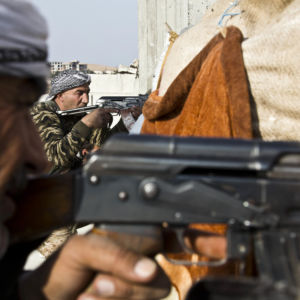Editor’s Note: For an alternative viewpoint, please see: Counterpoint: Don’t Intervene in Syria’s War — End It
On November 12, in an interview with ABC’s George Stephanopoulos, President Obama waxed optimistic about the current state of U.S. counterterrorism strategy. His administration’s efforts over the past year had successfully “contained” the Islamic State, Obama said. “I don’t think they’re gaining strength.”
It took less than 24 hours for the terrorist group to prove the president wrong. On the evening of November 13, ISIS-inspired militants went on a rampage in Paris, carrying out a series of devastating coordinated attacks at a sports arena, a theater, and on various streets in the “City of Lights” that left 130 dead and nearly 400 injured.
The massacre was a savage reminder of the bankruptcy of the West’s approach to the war on terror in general — and that of the Obama administration in particular. Having extricated the country from first the conflict in Iraq and subsequently the one in Afghanistan, the White House has been loath to commit seriously, in terms of both resources and military manpower, to rolling back and ultimately eradicating the group.
Instead, Washington has responded to the advance of ISIS in Syria and Iraq with overwhelmingly tactical efforts, from limited air strikes to selective economic warfare. The result has been lackluster at best. So far, the United States has failed to engage fully the world’s premier terrorist franchise on the various fields of battle — economic, informational, military and ideological. And without the organizing presence of the United States, most other Western nations have been similarly deficient.
Post-Paris, a serious rethink of this state of affairs is in order. The November 13 attacks — which were perpetrated by European Islamists who had taken up the ISIS call to arms — concretely demonstrated that the group’s appeal stretches far beyond the Syrian and Iraqi battlefields. So, too, do its objectives. In the wake of the Paris attacks, the group has announced its intention to attack other Western targets, among them New York’s Times Square and assorted public venues in Washington, D.C.
Some Western nations have begun to respond. In the aftermath of Paris, the French government has committed airpower to the campaign against ISIS, as has Belgium. The United Kingdom is similarly ramping up its anti-ISIS operations. In coming days, still more might follow suit. But Europe’s limited military capacity and internal political divisions dictate that a real, sustained anti-ISIS effort requires leadership from the United States.
Time, moreover, is of the essence. Currently, the Islamic State is in the process of consolidating its hold on the territory it controls in the Middle East, and seeking to acquire still more. But the longer ISIS is entrenched in places like Iraq and Syria, the more its barbarism is institutionalized and transferred to the next generation of radicals.
A new PBS documentary series about the Islamic State’s activities in Afghanistan provides a worrying glimpse at exactly what this looks like. Horrifying file footage of ISIS foot-soldiers indoctrinating young Afghans into their intolerant creed, and providing these docile recruits with lethal weapons training, hammers home the point that the longer the Islamic State’s “caliphate” remains in existence, the more protracted our struggle with radical Islam will become.
Simply put, on territories under its sway, ISIS is now breeding the next generation of jihadis. Those youngsters will ensure the longevity of the group’s ideology, and guarantee perpetual war against anyone who does not believe in their austere creed. Unless, that is, the ideological stranglehold now being imposed on them by the Islamic State is broken.
In order for that to happen, however, the United States and its allies need to engage far more seriously than they have to date in the counterterrorism fight, both on an intellectual level and on a military one. As the tragedy in Paris has so brutally demonstrated, it is long past time for us to start.

